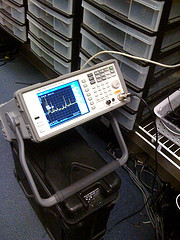
Hardwired
My friend Mike Sessler has a great post up about the latest FCC Ruling. Take a look at his post if you haven’t seen it, yet, because I’m going to piggy-back on it.
The biggest change in this whole thing seems to be the elimination of the requirement for broadband devices that are coming to detect if an RF device is active. I think the FCC basically is saying that wireless mics, IEMs, etc. aren’t licensed so they’re not going to get special treatment or protection. If users want special treatment, they need to go through the proper channels and get things licensed. I’m not sure what’s required to do that or how possible it even is because I’ve heard stories. If it is possible I doubt it’ll be easy or simple, but I’ll definitely be looking into it a bit more now. More on that if it happens.
In light of all this FCC stuff that seems to be in constant flux, I want to beat a drum once again for hardwired gear. I think I’ve talked about this in webinars and maybe here on the blog. While I think it can be more difficult to go the hardwired IEM route, there is nothing wrong with hardwired mics and in a lot of cases it can really be the best route to take.
The reality is that most churches don’t need nearly the amount of wireless stuff as they think they do. It’s probably nice to give your pastor a wireless mic, but beyond that I don’t know that it’s really a need. Most singers in churches stand in one place. They don’t work the stage. They don’t roam around the room. A wireless mic for a singer is typically more of a convenience thing or a cool factor and in light of the flux in RF world maybe not the best idea.
I know in our situation the primary reason we use wireless mics is because our stage needs to be completely clear of band and band gear after the music. That transition is typically in the 60 second range so every second counts, and pulling RF mics off stage is a lot easier and faster than dealing with cables. It would be a hard road for me to convince our team to let us use more hardwired mics, but the fact is I prefer a hardwired mic just about any day.
The popularity of RF mics has maybe clouded our memories of some of the benefits of hardwired so here are a few reminders:
– Batteries don’t die in hardwired mics.
In my experience, it’s more rare for a cable to just stop working than for a battery in a mic to die. A hardwired mic is either plugged in or not.
– Hardwired mics cost less than RF mics.
This means it is easier to build up a collection of a variety of mic capsules so you can better fit them to individual singers. Going the RF route typically ties you into one manufacturers microphones which can limit your options on capsules.
– No Ongoing Costs for Hardwired Mics.
You don’t have to keep buying batteries for hardwired mics.
– Hardwired mics are less prone to feedback.
The companding that takes place in RF mics uses compression which reduces your gain before feedback. Companding in higher end RF mics is very good and very close to the sound of a wire these days, but the mid- and low-level stuff is a crapshoot and what I see more often in church world.
– Hardwired is a legitimate way to mic a singer.
A lot of big shows are still using hardwired mics on their singers. If you have someone on stage that doesn’t go anywhere when they’re singing, a hardwired mic is a legitimate option.
Now, all that said, if I was in another gig I wouldn’t abandon RF mics if I already had access to them. However, if I was looking at making a large investment in RF mics now or in the future, I would definitely be constantly evaluating that decision before actually making a purchase.

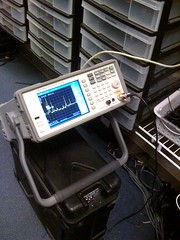
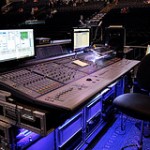 Previous Post
Previous Post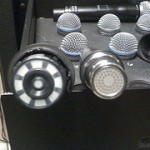 Next Post
Next Post

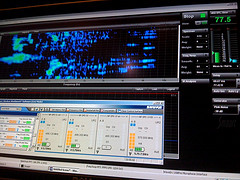



Hey Dave, great post. I’m literally sorting out the wireless situation for my church as I type so this helped alot!
I’m based in the UK so we have slightly different laws on wireless stuff however we have ultimately the same issues. One thing I’ve been meaning to ask is your opinion on digital wireless mics, namely the latest offering from line6. Over this side of the pond it’s called the XD-V70 but I’m pretty sure it’s equivalent to your X2 or something with an ‘X’ in it (in typical line6 style)
Initially the fact that it’s line6 is a worry but I can’t help noticing the Pod X3 actually sounds good! Know anyone who might have heard them? I’ve heard rumours of longer battery life, no companding and little/no interference.
Thankyou so much for sharing your ministry online. It’s a blessing to be able to share in your journey and it’s a great influence for me on mine! Keep on blogging!
I haven’t heard the Line 6 mics. I know a few of our guitarists have brought in the wireless guitar version, and they seem to like it. My biggest concern with digital mics would be the latency involved in the analog/digital conversions that need to take place; it’s probably fine for FOH, but this kind of latency can bother singers on IEMs. Following that I’d be concerned with the quality of those conversions and the built-in mic pre’s in the mics.
Line 6 doesn’t generally target the professional audio world so I would consider their stuff a little suspect for my own applications. There might be no companding, but the rest of the equipment(mic pre, capsule, converters, etc.) might not be up to the standards I’m used to from Shure and Sennheiser.
If I was going to do something with digital RF mics, I would be looking at the Lectrosonics stuff. But even there I’d probably mainly use it for PA optimization purposes and not stage purposes. I had started looking at the Lectrosonics stuff at one point to potentially build some wireless mic stands that we could use conventional handheld mics with, but we still ended up going the Shure UHF-R route. Maybe when the time comes to replace those the digital stuff will be farther along, but in the meantime I’m not ready to jump on that one.
I’ve seen such churches who think wireless is the only way to go. And the recent FCC ruling cost them unnecessary expenses. It’s always good to ask the question of any technology; “do I need this or do i want this?”